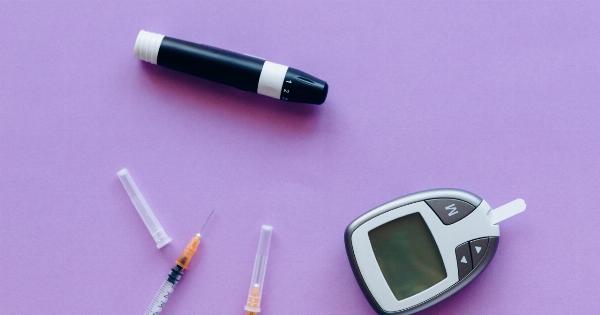Grapefruit is a delicious and refreshing fruit that is packed with various nutrients and vitamins.
However, as much as I love enjoying a juicy grapefruit, I recently discovered that this seemingly innocent fruit can have a significant impact on the effectiveness of certain medications. In this article, I will delve into the details of how grapefruit interacts with medications and share my personal experience with this unexpected interaction.
Understanding the grapefruit effect
Before delving into my personal experience, it is important to understand why grapefruit can cause potential problems when taken with certain medications.
Grapefruit contains compounds known as furanocoumarins, which interfere with the activity of specific enzymes in the body. These enzymes, known as cytochrome P450 enzymes, are responsible for breaking down various substances in the body, including certain medications.
The medication grapefruit interaction
When a medication is consumed, it is metabolized by the cytochrome P450 enzymes in the liver before it can exert its therapeutic effects.
However, the furanocoumarins present in grapefruit inhibit the activity of these enzymes, leading to impaired metabolism of medications.
This impaired metabolism can result in higher-than-intended levels of the medication in the body, leading to potential side effects or toxicity.
On the other hand, grapefruit can also reduce the effectiveness of certain medications by decreasing their absorption or inhibiting their transportation into the bloodstream.
Personal experience with grapefruit and medication
As someone who enjoys grapefruit on a regular basis, I never anticipated that it could interfere with my medications. I recall a specific incident where I experienced increased side effects when taking a specific medication along with grapefruit juice.
At the time, I couldn’t understand why I was feeling worse than usual.
Curiosity led me to do some research, and to my surprise, I discovered that grapefruit can interact with a wide range of medications, including those used to treat cardiovascular conditions, cholesterol-lowering drugs, certain antipsychotics, and even some anti-anxiety medications. It was a bewildering revelation and made me reconsider my grapefruit consumption habits.
The impact on medication effectiveness
One of the most concerning aspects of the grapefruit effect is its potential to reduce the effectiveness of certain medications. Medications that are affected by grapefruit include statins, which are commonly used to lower cholesterol levels.
Grapefruit can inhibit the absorption of statins, leading to reduced effectiveness and potentially increased cholesterol levels.
In addition to statins, grapefruit can also impact the effectiveness of certain antihypertensive medications, such as calcium channel blockers and beta-blockers.
This can result in higher blood pressure levels and an increased risk of cardiovascular events.
Unintended medication overdose
On the flip side, grapefruit can also lead to unintentional medication overdose by increasing the levels of certain medications in the body.
This can be particularly dangerous when it comes to medications with a narrow therapeutic index, meaning that the difference between a safe and toxic dose is small.
For example, grapefruit can significantly increase the blood levels of certain anti-anxiety medications, leading to excessive sedation and respiratory depression.
This is a known concern with benzodiazepines, a class of drugs commonly prescribed for anxiety disorders.
Managing grapefruit-medication interactions
Considering the potential risks associated with grapefruit-medication interactions, it is crucial to be aware of any possible interactions before consuming grapefruit or grapefruit juice.
Consulting with a healthcare professional is essential in order to determine whether it is safe to consume grapefruit while taking specific medications.
If grapefruit consumption is contraindicated for a particular medication, it is important to refrain from consuming grapefruit or its juice.
Alternatively, the medication can be taken several hours before or after consuming grapefruit, allowing enough time for the body to metabolize the medication without interference from furanocoumarins.
Grapefruit alternatives
For those who enjoy the flavor of grapefruit but are required to avoid it due to interactions with medications, there are alternative fruits that can provide similar taste profiles without the potential risks.
Citrus fruits like oranges and lemons can be excellent substitutes, offering refreshing flavors without interfering with medication effectiveness.
It is important to note that while grapefruit is the most well-known fruit that interacts with medications, other citrus fruits, such as limes and Seville oranges, can also pose similar risks due to the presence of furanocoumarins.
Therefore, it is essential to exercise caution and consult a healthcare professional when consuming these fruits alongside medications.
The importance of medication information
The interaction between grapefruit and medications serves as a reminder of the importance of being fully informed about the drugs we take.
It is crucial to read medication labels, patient information leaflets, and consult healthcare professionals to ensure a comprehensive understanding of potential interactions and risks.
Furthermore, regularly reviewing medications with healthcare professionals can help identify any possible interactions with grapefruit or other substances.
This ongoing dialogue ensures that we are aware of any changes or precautions we need to take regarding our medications.
Conclusion
Grapefruit, despite being a nutritious and delicious fruit, can have a significant impact on the effectiveness of certain medications.
The presence of furanocoumarins in grapefruit can interfere with the metabolism and absorption of medications, leading to potential risks such as reduced effectiveness or unintentional overdose.
It is crucial to be aware of possible grapefruit-medication interactions, consult healthcare professionals, and read medication information thoroughly.
By taking proactive measures and making informed decisions, we can ensure the safety and effectiveness of our medications, ultimately leading to better health outcomes.































